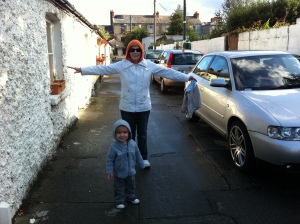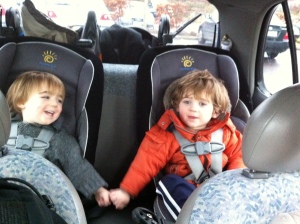Why French Parents Are Superior by Pamela Druckerman – WSJ.com
Someone posted this link to Facebook and it’s getting a lot of press right now. It’s an excerpt from a new book by an American mother living abroad and how she feels that the French put stricter boundaries on their children, discipline with more “conviction,” and therefore, their children sit quietly in high chairs in restaurants and leave their parents free to enjoy adult conversation. In other words, yet another indictment of overparenting culture, which Druckerman, in “Bringing Up Bebe: One American Mother Discovers the Wisdom of French Parenting,” suggests is particularly American.
After Druckerman and her husband decide to take a trip to a coastal town in France with her 18 month-old, she writes:
“We quickly discovered that having two restaurant meals a day with a toddler deserved to be its own circle of hell.
Bean would take a brief interest in the food, but within a few minutes she was spilling salt shakers and tearing apart sugar packets. Then she demanded to be sprung from her high chair so she could dash around the restaurant and bolt dangerously toward the docks.
Our strategy was to finish the meal quickly. We ordered while being seated, then begged the server to rush out some bread and bring us our appetizers and main courses at the same time. While my husband took a few bites of fish, I made sure that Bean didn’t get kicked by a waiter or lost at sea. Then we switched. We left enormous, apologetic tips to compensate for the arc of torn napkins and calamari around our table.
After a few more harrowing restaurant visits, I started noticing that the French families around us didn’t look like they were sharing our mealtime agony. Weirdly, they looked like they were on vacation. French toddlers were sitting contentedly in their high chairs, waiting for their food, or eating fish and even vegetables. There was no shrieking or whining. And there was no debris around their tables.”
Remember the picture I posted of the debris field around our table that I tried to contain with linen napkins while on holiday? How we felt like we were the only ones, despite being in a family resort? How we spent a small fortune on room service to avoid the exquisite torture of dining in public with them?
Normally it would be easy for me to dismiss her by saying, well, yeah, but she doesn’t have twins. But guess what? Later on she does have twins. Boys, in fact.
So six months into our life abroad, with my Euro-American twin sons and their Continental accent, I read the excerpt with fascination. Clearly, there’s an inherent problem with the sweeping generalization of “us” (i.e., American parents) vs. “them” (French parents) in her argument. But I understand they are trying to sell books piggy-backed off the success of “French Women Don’t Get Fat,” and sound very controversial. (Stay tuned for my forthcoming book, “French Women Don’t Read Self-Help Books.”) Nothing gets Americans more defensive than saying another country is superior, right? I would be curious to know if there is less Ativan or Zanax prescribed (and paid for) by the French National Health Insurance.
Why would it be just the French who are immune to this modern age of anxiety, and not say, Spanish parents, or Italian ones? Here in Dublin, the parents of other children where the boys attend creche are Italian, German, and Danish, in addition to being Irish (this is a reflection of the location–we are near the embassy zone–as well as how diverse the population of Dublin is, with people from all over the EU). I do not notice any pronounced difference, except perhaps, that European toddlers tend to wear scarves.
The biggest demarcation appears to be socioeconomic class. You know, the class that (ahem) has the leisure to write about, blog about, and read about parenting as if it was a hobby or project one was trying to get better at. Which to me is overparenting in and of itself, no? (And I am very, very guilty of this, which also has much to do with having children later in life and stopping work to be with them.) In fact, this book sits upon a very tall stack of parenting how-to books, a cottage industry that thrives off making you afraid you are doing something wrong, thereby engendering anxiety. My mother certainly never sat around and read books like “Positive Discipline” while raising the four of us. Those worrying about foreclosure or dealing with chronically ill children certainly are worried about other issues than the latest trend in parenting. Isn’t that what they say our anxiety is, evolutionary adaptations run amok because in reality, we have very little of actual and pressing danger to worry about?
People have often asked us if there’s a culture shock being here, and we tell them it’s negligible. There was much more of a culture shock when I lived in Japan. The only difference I have ever observed has more to do with parents in cities and parents in small towns. Living here in Dublin is somewhat similar to the transition we would have felt, I think, if we moved back to NYC after leaving small-town America. But again, that’s really about class in certain pockets of cities.
My neighbor, a German mom of two boys, told me that, “Ten years ago, there weren’t the big cars. You didn’t see Range Rovers trying to drive around these narrow streets. With the big sunglasses. And the big bags. Suddenly, all the mums were carrying coffee and big purses and wearing big sunglasses. And they all went blonde.”
This was her humorous way of explaining the sudden wealth many people living in Dublin found themselves in during the Celtic Tiger years, and the attendant status anxiety. Apparently, it made everyone think they should look like Nicole Richie pushing a pram.
“Bringing up Bebe” seems like it might have been better suited to an anecdotal op-ed instead of a book. And I do wonder how much her being an expat, particularly an American one, carried its own issues that didn’t have anything to do with parenting.
I am curious what fellow parents out there think about this, especially European ones. The book is written from an American point of view. What do, say, Irish parents think about French ones? Or Italian? Or Spanish? Those of you who also parented while abroad, did you notice any cultural differences?
(As a postscript I should mention that I’ve started saying, “That’s not possible,” to my sons’ varied and unending demands in case she’s on to something.)




